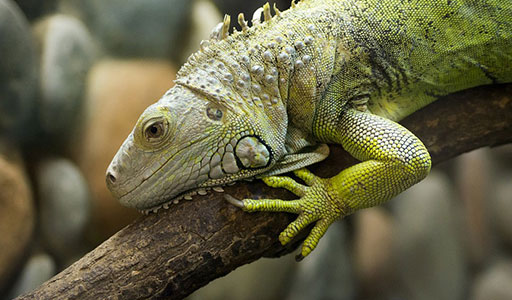Iguana Removal
Do you need to get rid of iguanas? We can help!

Iguana Removal Strategies
Coveted pets due to their docile natures and exotic appearances, green iguanas, sometimes referred to as common iguanas, slowly gained a presence in the U.S. as a result of the pet trade. Thanks to a combination of escaped iguanas and owner negligence, the South and Central American natives now thrive in distinct climates in the Nearctic region. Though large and awkward-looking, green iguanas are deceivingly agile and have the ability to climb trees easily or make haste on the ground. In addition to their classification as invasive pests, iguanas are widely disliked due to their destruction of landscaping and disease transmission.
Iguana Problem

Signs a Iguana is on Your Property
Iguanas are invasive animals native to South America. This phenomenon contributes to iguana overpopulation in places that cannot support the animal. Iguanas have become a problem in cities in South Florida like Fort Myers, Fort Lauderdale, and Naples.
Large reptiles, iguanas can weigh in excess of 18 pounds and reach lengths of up to 7 feet. Identifying characteristics include their long tails, short legs, and soft, leathery scales.

Dangers of Iguana Infestation
While typically docile, male iguanas become aggressive and territorial during mating seasons. Picking up wild iguanas is inadvisable, as they quickly become defensive and thrash about, which can result in injury from their clawing and tail whipping. In addition to their feeding habits contributing to vegetation depletion, iguanas construct burrows where they keep their developing offspring, which results in landscape destruction. Furthermore, water sources can be contaminated with their feces.
Humane Iguana Removal & Control Strategies

Entry into property
Iguanas rarely enter buildings. However, the animals frequently trespass on suburban lawns in the regions where they are active. Features that attract iguanas to residential yards include tree cover and various types of edible plants that produce fruit, flowers, or foliage. Pools often draw them to private properties, as well.

Trapping & Removal
As iguanas can carry salmonella, individuals should avoid handling the reptiles and instead call professional removal services. Trutech specializes in green iguana removal and is ready to develop eradication plans unique to specific properties. Take advantage of our technicians’ extensive backgrounds in pest removal for the best possible results.

Prevention & Exclusion
Property owners can utilize exclusion methods as a type of iguana control. By eliminating the reptile’s access to vegetation, individuals can successfully repel iguanas from residential areas. Favored plants include orchids, roses, and turf grasses, while plants that deter the animals include milkweed, citrus, and oleanders. Nets designed for excluding the pests can be purchased, as well as various tree attachments that prevent iguanas from taking up residence in treetops.
Frequently Asked Questions
Almost any animal will bite under certain circumstances and iguanas are no exception. While they may look like miniature dinosaurs, these reptiles are generally not aggressive. However, during mating season or when provoked, they can lash out with their serrated teeth. Like crocodiles, iguanas’ powerful jaws are designed for tearing rather than chewing, so they tend to clamp down and hold on. Trying to push them away only makes the pests bite harder and may turn simple punctures into more serious injuries. Holding rubbing alcohol in front of its nose may encourage a stubborn iguana to let go.
More than simply painful, iguana bites can result in several health problems. Since these pests often leave their teeth embedded in the skin, tetanus or infection may follow if even small injuries are incorrectly treated. Iguanas also carry Salmonella in their intestines and several Gram-negative bacteria in their mouths, which can transfer to humans when the pests bite. As these organisms are resistant to many antibiotics, inform medical professionals that the bite came from an iguana to get the right treatment.
When an iguana is in the home or yard, it will use its razor-sharp teeth to chew through items. The pests often damage expensive landscaping and may be found swimming in private pools or ponds. Their presence can also attract other unwanted wildlife, such as raccoons, feral pigs, and snakes, who feed on the eggs and young of iguanas. Many states have trapping and release laws regarding exotic, non-native animals like iguanas. It’s recommended to call the professionals at Trutech for the safe, legal, and humane prevention or removal of iguanas from private property.
Caging or screening off garden plants may protect them from iguanas but won’t stop the pests from wandering into yards. Iguanas’ strong climbing ability makes them difficult to keep away even with fences in place. Because these reptiles can act aggressively when provoked or harassed, property owners who attempt to remove the pests on their own may receive deep scratches or painful bites. After finding iguana tracks or footprints in the yard, call the wildlife experts at Trutech for safe and effective removal.


